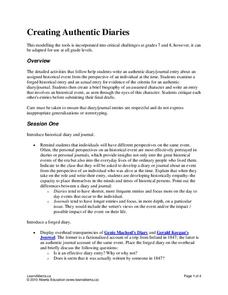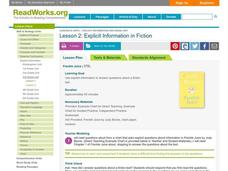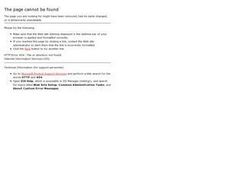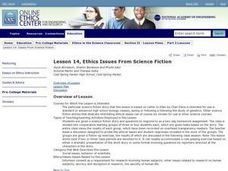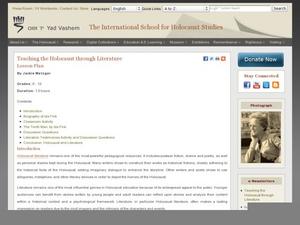City College of San Francisco
Making Inferences: Reading Between the Lines
Have you ever read part of a story and had to figure out what the rest was about? Practice making inferences with several short passages and multiple choice questions.
National Endowment for the Humanities
Edgar Allan Poe, Ambrose Bierce, and the Unreliable Narrator
Stories by Edgar Allan Poe and Ambrose Bierce provide readers with an opportunity to investigate unreliable narrators. The lesson plan begins with an activity about different types of point of view and continues as scholars apply their...
K5 Learning
The Bonfire in the Sea
Ever wonder why fish disappear from the surface of the water in cold weather? Fifth graders read a fun story about the magical fish tribe and their underwater bonfire before answering four comprehension questions.
Alberta Learning
Creating Authentic Diaries
Napoleon Bonaparte once said, "What is history but a fable agreed upon?" A series of lessons encourages learners to look beyond the basic fable agreed upon related to events in history and consider multiple accounts of the event. The...
PBS
Exploring First-Person Narrative
If you really want to know, this is a terrific instructional activity all about narratives, which is just a fancy way of saying telling stories. And you get to do it without being phony or anything. My favorite part is that you get to...
Curated OER
Jamestown Fort: Finding History
Students identify artifacts discovered from the exploration of the Jamestown fort in order to help them create a short fictional account about the lives of Jamestown's first inhabitants. In this history lesson, students research the...
Curated OER
Writing a Fantasy Story - Time Travel
Students write a fantasy story about time traveling back to the time of the Oregon Trail. In this Oregon trail lesson students gather information from their Social Studies textbook about life during the time of the Oregon Trail.
Curated OER
Explicit Information in Fiction
Third graders read the story Freckle Juice and answer short answer questions by providing explicit information. In this explicit information worksheet, 3rd graders do this for chapters 3, 4, and 5.
Curated OER
Haunted House
Read alouds are great ways to build fluency, accuracy, and intonation. Each slide contains part of a story about a haunted house and audio of the story being read aloud by several different children. Whether you use it as a reading...
Curated OER
Analyzing Short Biographies to Discover Characteristics of Biographical Writing
Students read short biographies on Abraham Lincoln from various artists. Using the texts, they identify the subject of the biography and discuss whether or not illustrations contribute to a biography. They research specific information...
Curated OER
Predictions: Technologies of the Future
Visit the world of science fiction with this graphic organizer focusing on predictions. Complete the chart to determine the possible positive and negative side effects for two examples of future technology. Then, have writers choose one...
Curated OER
New York State Language Arts Test Grade 4
Quiz your class with this New York state language arts test. The test is composed of several informational and fictional passages and 28 multiple choice questions. The questions are based mostly on reading comprehension.
PB Works
George Washington’s Socks: Short-Answer Questions Chapters 1-9
Build a literature unit around the book George Washington's Socks with this series of short answer questions. Broken up in two- and three-chapter increments, these reading comprehension questions allow young readers to demonstrate their...
K5 Learning
The Fox and the Little Red Hen
Read about the fox family that decides to cook a hen for dinner. After reading, individuals answer questions about the elements of plot in the story. They require drawing conclusions, making predictions, and describing specific parts in...
Scouts
The Deadly Picnic: A Lab on Deductive Reasoning
Whodunnit? Find out who killed Mr. Brooks through a logical examination of evidence. Class members fill out a couple of data tables to help them pin down the suspect. After they've figured out just who the culprit is, pupils compose...
Curated OER
A "How To" Project in the Science Fiction Genre
You can have students use science fiction elements to create a "How To" brochure that can stir the imagination.
Curated OER
The Mitten
In this reading comprehension instructional activity, students read a short fiction story. They sew two sides of a mitten cut out together. Students color pictures of animals mentioned in the story. As students read the story, they put...
Curated OER
Parts of a Story
Students read a short fiction book and demostrate comprehension by identifying the main characters, setting, conflict, theme, and summarizing the main points. They organize the information in Inspiration and create a powerpoint to show...
Curated OER
Short Stories Word Puzzle
For this word puzzle, students identify thirty four words related to elements of a short stories in a word puzzle. Examples include theme, symbol, rising action, and irony.
Curated OER
Chivalry
Eighth graders explore manners by writing short stories. In this chivalry code lesson, 8th graders identify the traits of chivalry and explore the history of chivalry in England. Students complete a chivalry worksheet and write a...
Curated OER
Science Fiction
Students write a science fiction story. In this science fiction lesson, students read selections of science fiction and compare them to supernatural stories from the Bible. Students identify themes and discuss elements that are common...
Curated OER
Ethics Issues From Science Fiction
Students analyze ethics issues as they read science fiction works. In this science and ethics lesson plan, students read science fiction short stories of their choosing, investigate the ethics issues raised in the stories, and present...
Curated OER
Teaching the Holocaust through Literature
Centered on the short story "The Tenth Man" by Polish Holocaust survivor Ida Fink, here is a solid one-day resource to support study of World War II or Nazi history, short stories, or to complement any ELA unit on The Diary of Anne Frank...
Curated OER
The Magic Apple
A fun and delicious activity can help your kids learn about plural nouns and story sequencing. After reading The Magic Apple by Rob Cleveland, kids match pictures to story segments and add s to nouns to make them plural. They then cook...





